Are you struggling to find the best e-commerce LMS platforms? Here are 10 of the best ones you should try in 2025.
As e-commerce grows, so does the need for efficient and scalable learning platforms that can handle everything from internal staff development to external client training. This is why an e-commerce learning management system is becoming a must-have for e-commerce platforms in 2025. It helps companies train employees, engage with companies, and offer valuable product training.
The market size of learning management systems is estimated at approximately $24.5 billion in 2024, demonstrating the growing potential of this sector. The ever-increasing demand for interactive and intelligent learning platforms primarily drives this surge. If you haven’t already integrated it into your eCommerce training, it might be time to step up and take action.
In this article, we’ll look at the 10 best eCommerce learning management platforms you should try in 2025 so you don’t have to look for one that suits your needs. Let’s get straight to the point.
1. Coursebox – Best Ecommerce LMS for Companies

Coursebox is an innovative AI-powered platform that makes creating and managing online eCommerce courses easy. It serves as a course creation tool and an eCommerce learning management system, making it useful for businesses delivering practical training and educational content.
Using artificial intelligence, Coursebox simplifies the course development process, allowing companies to create high-quality learning materials tailored to their needs quickly. With an eCommerce learning management system, you can train your employees and educate your customers with high-quality training materials.
Key Features
- AI-powered course creation: Coursebox speeds up course creation by automating the process using AI.
- Content conversion: You can quickly turn existing content, such as videos and documents, into interactive courses. This helps you reuse your existing materials.
- AI Test Generator: Tests and assessments are automatically generated, making the assessment process quick and easy.
- AI Chatbot: The AI-powered chatbot offers instant support to students. By using this feature, you can confirm that users receive real-time responses.
- White Labeling: Coursebox allows you to customize the platform with your brand. This gives you complete control over the learning process.
- Mobile accessibility: Students can access the platform from their mobile devices. This makes learning flexible and allows them to learn at a time that suits them.
Pros
- Speeds up the course creation process with AI
- Reduces the need for manual content creation
- Easily scales as your business grows
- Offers interactive features to keep learners engaged
Cons
- Sometimes, AI-generated content may need to be adjusted
Why should you choose Coursebox?
Coursebox is an excellent choice for e-commerce businesses looking to enhance their learning further. The platform’s AI features make creating courses easy and fast. You can use your course content to create videos using AI, saving you time and money by not hiring trainers to record the videos.
2. Docebo
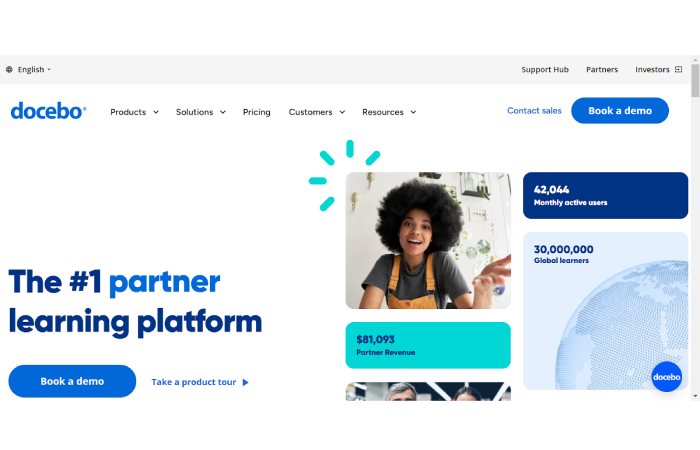
Docebo is a cloud-based learning management system for e-commerce that uses AI to improve the learning experience. It offers a complete set of features ideal for e-commerce businesses to streamline learning and provide effective solutions.
With Docebo, you can efficiently create and manage courses, ensuring your team stays updated with the latest industry trends. The platform’s AI capabilities also personalize learning paths, making learning more engaging and relevant.
Key features
- Content Management: Allows companies to create and manage various training materials easily.
- Social Learning: This feature facilitates collaboration and knowledge sharing among students.
- Mobile Accessibility: Docebo allows students to access courses across multiple devices and promotes flexible learning.
- Analytics and Reporting: Provides insights into student progress and course performance.
Pros
- AI-powered customization that increases learner engagement
- Accommodates growing teams and training needs
- Intuitive design with easy navigation
Cons
Prices can be higher compared to other LMS platforms
3.LearnWorlds

LearnWorlds is an e-learning platform that allows companies to create and sell interactive online courses. It provides tools to enhance the learning experience, making it ideal for e-commerce training.
With the LearnWorlds e-commerce learning management system, you can build engaging courses with multimedia elements, assessments, and interactive features. The platform also offers e-commerce features that allow companies to monetize their courses.
Key Features
- Interactive Course Builder: LearnWorlds helps create engaging courses with multimedia and interactive elements.
- E-commerce Integration: Allows companies to sell courses directly from the platform with integrated payment options.
- Assessment Tools: This feature includes quizzes and assignments to evaluate student progress.
- Mobile Learning: With this feature, students can easily access courses on mobile devices for flexible learning.
Pros
- Provides tools for creating interactive and multimedia courses
- Built-in e-commerce tools to simplify course sales
- Offers the ability to match the LMS to your corporate identity
Cons
- Some users may find the platform’s features initially complex
4. TalentLMS
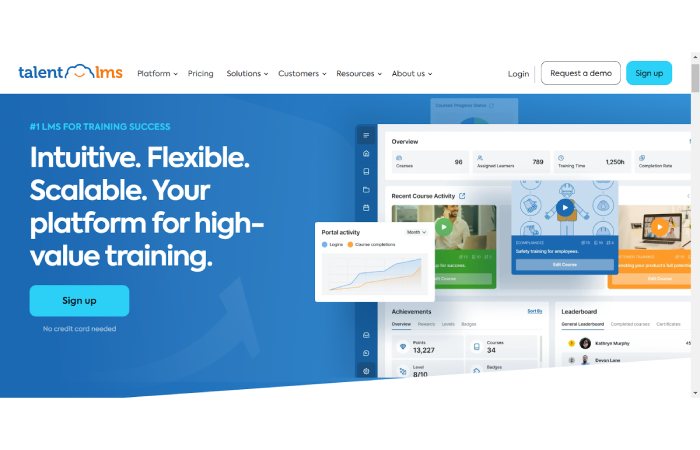
TalentLMS is a cloud-based e-commerce learning management system designed to streamline corporate training. It offers a user-friendly interface and features suitable for e-commerce businesses.
With scalability and AI-powered tools, TalentLMS adapts to businesses of all sizes. The system also provides mobile access, ensuring employees can learn anytime, anywhere.
Key features
- Course Management: With this, you can create and manage various learning materials, including web content, videos, audio files, text, presentations, and quizzes.
- AI-powered course creation: This feature uses artificial intelligence to automate and improve course development, reducing manual efforts and time.
- Mobile accessibility: Provides access to courses across multiple devices, facilitating flexible learning and allowing students to engage with content independently.
- Analytics and Reporting: With this story, you can gain insight into student progress and course performance.
Pros
- The user-friendly border that makes it easy to create and manage courses
- Scalable to meet growing teams and training needs
- Offers a variety of customization options
Cons
Prices can be higher compared to other LMS platforms
5.LearnDash
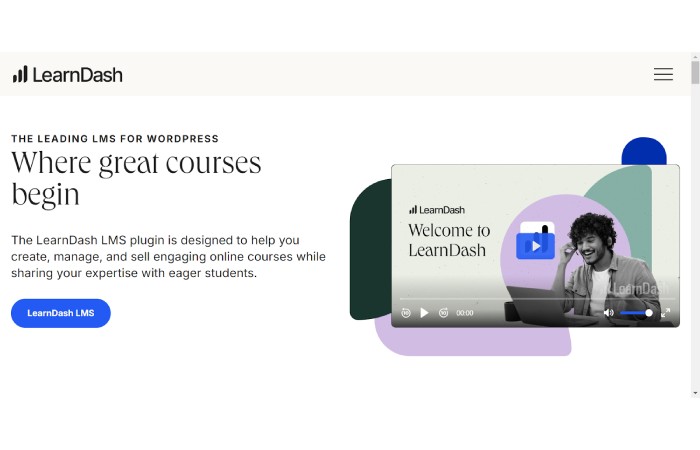
LearnDash is a WordPress plugin that converts your website into an authoritative e-commerce learning management system for online businesses. It’s perfect for e-commerce companies that want to offer online courses directly through their WordPress sites so that students can access content anytime, anywhere.
With deep integration with WordPress, LearnDash allows businesses to monetize their courses through various payment gateways, subscription models, or course packages.
Key Features
- Drag-and-Drop Course Builder: This makes it easy to create courses with an intuitive builder that lets you add sections, lessons, topics, quizzes, and assignments.
- Advanced Tests and Assignments: This feature helps create a variety of assessments, including multiple-choice, true/false, and essay questions.
- Analytics and Reporting: LearnDash provides information on student progress and helps companies measure the effectiveness of training programs.
- Social learning: Helps companies create community-driven learning environments.
Pros
- Highly customizable to suit a variety of training needs and business models
- Seamless integration with WordPress
- Offers a range of monetization options
Cons
Requires a WordPress site, which may not be suitable for all users
6. Academy of Mine
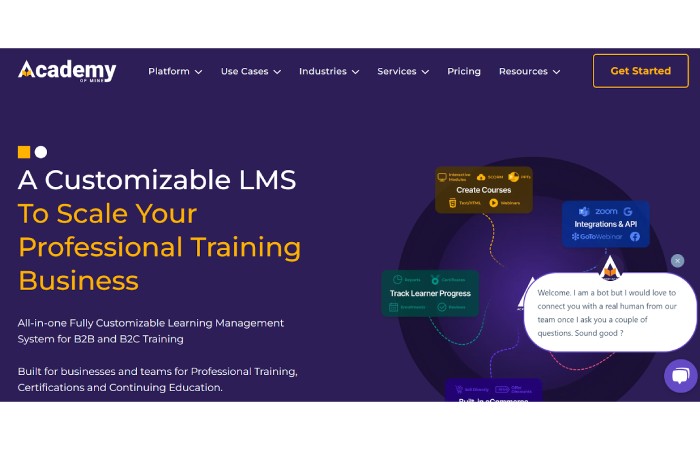
Academy of Mine is a comprehensive e-commerce learning administration system that offers a range of tools for creating and selling online content. It is designed to provide a seamless learning experience for both teachers and students.
The platform is suitable for both educational institutions and businesses that aim to provide vocational training.
Key Features
- Customizable Course Builder: With this, you can create sequences with different types of content, such as videos, quizzes, assignments and more.
- E-commerce Integration: It helps you sell courses and offer product training directly from the platform with integrated payment processing.
- Student Management: This feature is ideal for managing student enrollment, tracking progress, and communicating effectively
- Mobile Learning: Academy of Mine allows students to access courses from mobile devices.
Pros
- Integrates course creation, sales, and student management
- Offers extensive customization to fit your branding style
- Provides dedicated support to help set up and manage the platform
Cons
It may not integrate with all third-party tools
7. Tovuti LMS
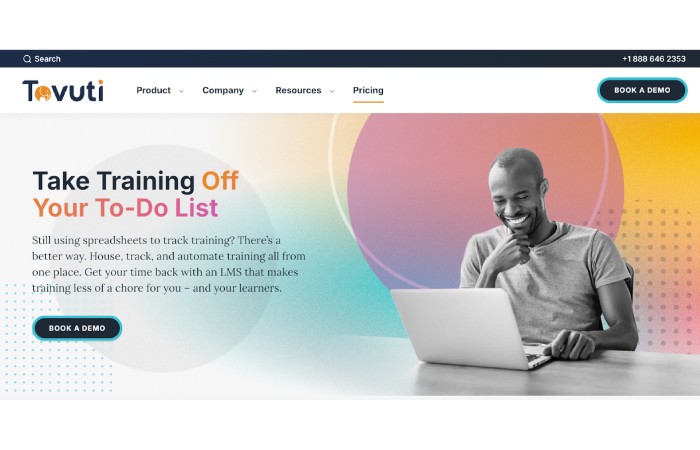
Tovuti LMS is another cloud-based learning management system for e-commerce designed to improve the learning experience. It is perfect for companies that want to provide practical training solutions directly on their websites.
This could be a course or educational content on any new product the company has released. Tovuti suits companies of any size and can be customized to fit your unique training needs.
Key Features
- Course Creation: Includes a built-in course creation kit for creating engaging content.
- Interactive Content: This feature offers tools like quizzes, flashcards, and polls to increase student engagement.
- Gamification in a learning management system: If you want to motivate students, you can use this feature to include badges, leaderboards, and rewards. User management: Tovuti LMS allows you to segment users into groups with assigned roles and permissions.
Pros
- Easy navigation for both administrators and students
- Combines course creation, delivery, and tracking into one platform
- Ideal for e-commerce businesses planning to grow as the platform is easily scalable
Cons
Some advanced course design and branding customization options may be limited
8. Absorb LMS
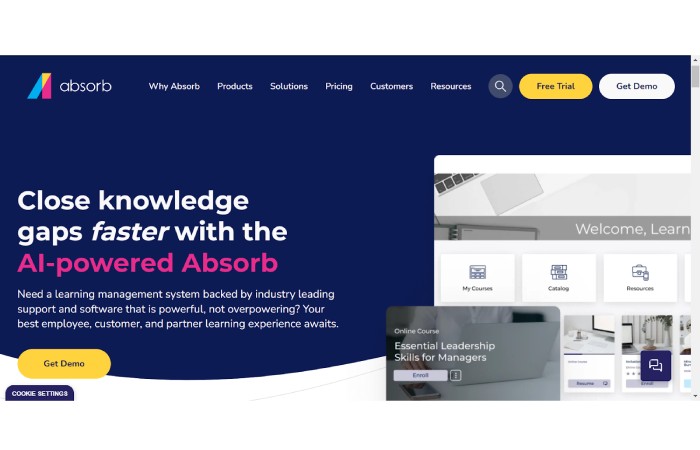
Absorb LMS is feature-rich and one of the best LMSs for small businesses. It is designed to simplify corporate training and improve the learning experience for e-commerce businesses.
With a modern design, powerful features, and robust scalability, Absorb LMS can support businesses looking to deliver high-quality training at scale.
Key Features
- Mobile Learning: This feature provides a responsive design and allows students to access learning content from any device.
- E-commerce integration: Allows organizations to sell courses directly through the platform and integrate with various payment gateways.
- Automated Reporting: Absorb LMS offers reporting tools to track student progress, course performance, and overall return on learning investment.
- Multilingual support: This is the best option for global organizations and ensures accessibility for various employees.
Pros
- Makes steering easy for both administrators and learners
- Suitable for organizations of all sizes
- Provides excellent customer support and training
Cons
Some features may not meet advanced needs
9. iSpring Learn

iSpring Learn is another e-commerce learning management system known for its ease of use and seamless integration with other iSpring tools. It is designed to automate training and increase employee retention through high-quality onboarding and on-the-job training.
One of the unique features of iSpring Learn is its reporting system, which provides companies with valuable information about learner progress, course performance, and areas for improvement.
Key Features
- Course Creation: This feature is integrated into the iSpring Suite and allows users to create engaging learning content such as online courses, video tutorials, and more.
- Learning Paths: You can use it to create step-by-step learning paths for individual students or departments. Integrations: The iSpring Learn learning management system can easily integrate with various business systems such as HRMS, CRM, and other third-party applications.
- Mobile Learning: Allows students to access knowledge content on the go, even offline.
Pros
- Intuitive interface for ease of use
- Offers a cost-effective solution suitable for small and medium-sized businesses
- Provides 24/7 customer support and training capitals
Cons
Reporting features may not be as comprehensive as competitors
10. Teachable

Teachable is a popular e-commerce learning management system for individuals and businesses looking to create, promote, and sell online courses. It is ideal for e-commerce businesses that want to monetize educational content and sell courses directly to customers.
Teachable supports various media formats, including videos, quizzes, and assignments, allowing businesses to create interactive and engaging courses.
Key Features
- E-commerce Integration: Teachable provides integrated payment gateways such as PayPal and Stripe. This allows businesses to sell courses directly on their website.
- Affiliate Marketing: You can set up affiliate marketing programs to promote your courses and increase sales.
- Drip Content: You can release course content over time to keep students engaged.
- Custom Branding: This e-commerce learning management system allows you to customize your course website with your logo, brand colours, and domain name.
Pros
- Easy interface for creating and selling online courses
- Multiple pricing models like one-time payment and subscription
- Integrated sales pages, email marketing, and affiliate marketing tools
Cons
Charges lower transaction fees
Transform your eCommerce training with an AI-powered learning management system.
E-commerce companies are always in need of an effective and scalable way to train both employees and customers. And they can do so with a robust e-commerce learning management system. Now, the main hurdle here is choosing the right platform.
If you’re unsure which one to choose, we recommend Coursebox as your #1 choice. Whether you want to train employees or sell educational content to clients, Coursebox offers the tools you need to succeed.
Frequently Asked Questions
1. What is an eCommerce Learning Management System (LMS)?
An e-commerce learning management system is a platform that combines learning management features with e-commerce capabilities. It allows companies to create, manage, and sell educational content related to their products while processing payments and customer interactions. This integration also simplifies the process of monetizing educational content.
2. Do e-commerce LMS platforms scale as my business grows?
Yes, most eCommerce LMS platforms are designed to scale with your business. They can handle increasing volumes of educational content, users, and transactions. Scalability ensures that as your business expands, your LMS can keep up with growing demand.
3. Can I offer certification through an eCommerce LMS?
If you sell courses, you certainly can. Many e-commerce LMS platforms allow you to issue certificates upon course completion. This feature adds value to your courses and can be used to recognize student achievement. You can also customize the certificates to reflect your brand and acquired skills.
4. Can I customize the look and feel of my eCommerce LMS?
Yes, eCommerce LMS platforms like Coursebox allow you to customize your LMS to fit your brand personality. They offer customization options such as themes, logos, and colour schemes. This will ensure your LMS has a cohesive, professional look that resounds with your audience.
Also Read: What are AI agents – Features, Benefits, Examples & How do they work

